To view more of our CTL events, see below for previous semesters.
Fall 2025
AI in Trinity Classrooms: Reports from the AI Writing Fellows and LITS AI Pedagogy Fellows
December 4, Common Hour – RLITC Joslin Family 1823 Room
Trinity’s AI Writing Fellows and LITS AI Pedagogy Fellows presented their innovative fall projects exploring artificial intelligence in teaching and learning during this lunch panel discussion. The AI Writing Fellows shared their experiences developing writing assignments and pedagogical approaches that thoughtfully responded to and incorporate AI tools across disciplines, while the LITS AI Pedagogy Fellows presented their broader AI teaching innovations. To view the talk, click here. |
|
Critical Oversight: How AI enhances thinking, how it hinders it, and how education can respond
November 13, Common Hour, Hallden Hall – Dangremond Family Commons 104
Online information literacy expert Mike Caulfield, Academic & Collaborative Technology Manager, University of Washington, detailed the ways that AI is augmenting cognition, ways it is hindering it, and what sort of education will help our students embrace use which expands capability and agency. Particular attention was given to the role of the liberal arts and the teaching of critical reasoning in a world infused with AI. Co-sponsored by Library and Information Technology Services. To view the talk, click here. |
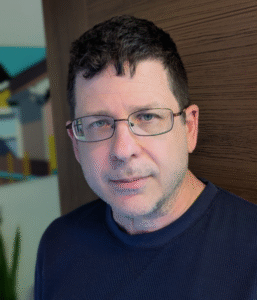 |
Tea & Teaching
October 23, 8:30 AM – 9:30 AM, Hallden Hall 101
Join us for “Tea & Teaching” on Thursday, October 23, for a cozy morning of informal conversations about all things teaching. We’ll provide tea and a home-baked snack—just bring your own mug! It’s a relaxed, supportive way to connect with fellow colleagues, share experiences, and get the teaching support you need in a warm, welcoming environment. |
|
Book Club: The Opposite of Cheating: Teaching for Integrity in the Age of AI
October 16, Common Hour, RLITC Joslin Family 1823 Room
Lunch and a discussion of this timely book about maintaining academic integrity in the age of AI and digital temptation. Authors Tricia Bertram Gallant and David A. Rettinger present a research-backed, forward-looking approach that moves beyond simply preventing cheating to creating learning environments that foster engagement and growth. They argue that educators should embrace practical strategies that help students understand the value of integrity while maximizing opportunities for authentic learning and meaningful human connection in both digital and traditional classroom settings. |
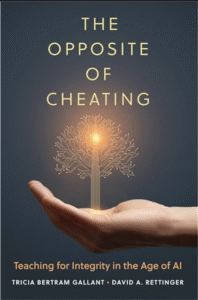 |
Panel: Teaching About Sustainability
September 25, Common Hour, Hallden Hall – Dangremond Family Commons 104
Faculty from Trinity, Wesleyan, and Connecticut College shared their expertise on incorporating sustainability topics across diverse disciplines during this panel discussion. Panelists Elan Abrell (Wesleyan – Anthropology), Rosario Hubert (Trinity – Language & Culture Studies), Susan Masino (Trinity – Psychology and Neuroscience), and Doug Thompson (Connecticut College – Geosciences) explored practical strategies for teaching about sustainability in various academic fields and discuss how faculty can integrate environmental topics in their courses. Co-sponsored by the Office of Sustainability. To view the talk, click here. |
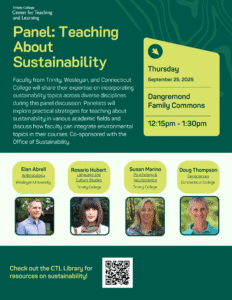 |
Spring 2025
Teaching & Learning with AI: Practical Activities for You and Your Students
March 13, Common Hour, Hallden Hall – Dangremond Family Commons 104
Join the Center for Teaching & Learning and the Digital Learning and Scholarship on Thursday, March 13th at the Dangremond Family Commons for our “Common Hour” workshop on thoughtfully integrating AI in the classroom. Inspired by Teaching with AI: A Practical Guide to a New Era of Human Learning by Jose Antonio Bowen and C. Edward Watson, this collaborative session will explore practical tools and strategies to enhance course planning, support student learning, and foster critical thinking in the AI era. |
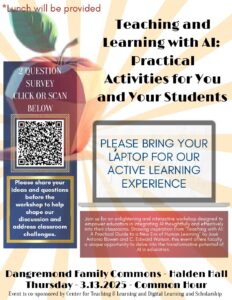
|
Fall 2024
Learner Variability and UDL Implementation: Practical Pathways to Create More Equitable, Justice-Oriented Classrooms
December 5, Common Hour, Hallden Hall – Dangremond Family Commons 104
This Center for Teaching and Learning talk, led by Gabrielle Rappolt-Schlichtmann ’97, Ed.D., Executive Director of EdTogether and Adjunct Lectuere at the Harvard Graduate School of Education, will explore the use of Universal Design for Learning (UDL) as a framework for supporting the design of equitable, accessible, and innovative post-secondary learning. Participants will be supported to, (1) identify and share UDL strategies already in practice, (2) consider ways to extend or enhance current use of UDL, and (3) define practical strategies for continuous improvement toward justice. The session will model UDL strategies and include interactive lecture, personal reflection, and small group discussion with attention to the role of rigor in UDL, as well as when flexibility might be contraindicated. Co-sponsored with Student Accessibility Resource Center (SARC). |
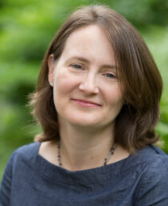
|
Project-Based Learning: What, Why and How
November 21, Common Hour, Hallden Hall – Dangremond Family Commons 104
Educators are currently grappling with how to give their students learning opportunities that engage their interest and minimize the potential for thoughtless, AI generated answers. Project based learning can be an answer. In this session, Kris Wobbe, PhD. Director of the Center for Project-Based Learning at Worchester Polytechnic Institute, will identify key principles of PBL, share data demonstrating its effectiveness, and share examples of high-quality projects from a broad range of disciplines. Participants will leave with guidelines and tips for developing high impact projects for their own students. |
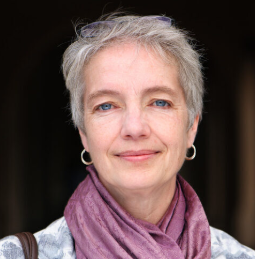
|
Harnessing Our Collective Resilience: The Science of Biological and Behavioral Resilience through Plasticity, Sociality, and Meaning
October 24, Common Hour, Hallden Hall – Dangremond Family Commons 104
During this workshop, Professor Mays Imad, Associate Professor of Biology at Connecticut College, will facilitate a conversation about the increase in self-reported burnout and disengagement in higher education. This is a challenge that affects all of us-our students and our colleagues. How can we support each other and ourselves to heal, re-engage with learning, grow, and thrive? Using her extensive research expertise on biological and behavioral resilience, Professor Imad will guide us in considering how we can empower ourselves and our students to ‘befriend’ our social engagement nervous system, so we can continue to engage, learn, and thrive. |
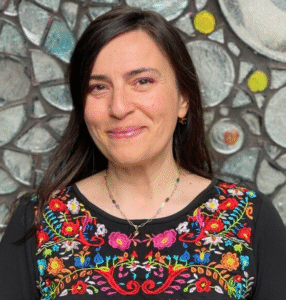
|
Book Club: Mind Over Monsters: Supporting Youth Mental Health with Compassionate Challenge
By Sarah Rose Cavanaugh
October 10, Common Hour, Hallden Hall – Dangremond Family Commons 104
Join us for lunch and a discussion of this thought-provoking book about the mental health challenges college students face. Psychology Professor Sarah Rose Cavanaugh takes the reader on an invigorating tour of pedagogical, neuroscientific, and psychological research on mental health, including her own journey from panic to equilibrium. She argues that to support youth mental health, we must create what she calls compassionate challenge—first,we need to cultivate learning and living environments characterized by compassion, and then we must guide students toward practices that encourage challenge, helping them face their fears in an encouraging, safe, and even playful way. |
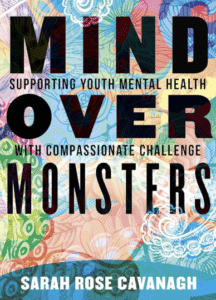
|
Navigating Classroom Conversations about Contentious Topics
September 26, Common Hour, Hallden Hall – Dangremond Family Commons 104
We often find it necessary to address challenging political issues that matter to our students, even if our courses or disciplinary expertise are outside the realm of politics or social change. Join us for an open conversation where we explore strategies for fostering respectful dialogue and critical thinking among students with diverse viewpoints. In small groups, we’ll share experiences, and resources. Together, we’ll work on balancing academic freedom with sensitivity to differing perspectives, ensuring our classrooms remain spaces for constructive engagement and intellectual growth. |
|
Spring 2024
Reflections on the Teaching Life: A Conversation
April 11, Common Hour
Join Sheila Fisher, Professor of English Emerita, for a reflective conversation on how teaching and learning has evolved over the past four decades. Fisher will share insights from her first class in 1978 through the rapid transformations of recent years, especially since 2020, and discuss how more than a decade of teaching in carceral settings has influenced her approach in the Trinity classroom. How has learning and teaching inevitably shifted for us all, and why? What are our greatest challenges and joys in the classroom? To view the talk, click here. |
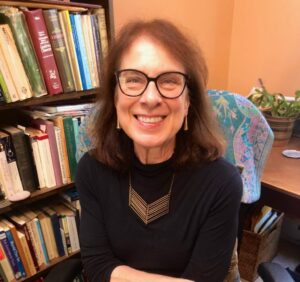
|
A Conversation about Grades: What Do They Mean, Who Are They For, and What Should We Do About Them?
March 28, Common Hour
Join us for a conversation with Jack Schneider, Professor at the University of Massachusetts-Amherst and co-author of Off the Mark: How Grades, Ratings, and Rankings Undermine Learning (But Don’t Have To). Drawing on the book, we will examine the history of grades in the U.S. and how they have come to be used here. We will explore the tension between grades as feedback to students and grades as durable signals to third parties, such as employers and graduate programs. Finally, we will discuss the ways in which individual faculty choices and institutional policies can shape the effects of grades on student learning. To view the talk, click here. |
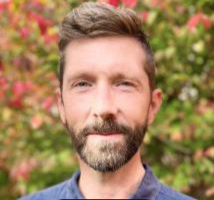
|
Using ChatGPT in the Classroom
February 29, Common Hour
As part of our ongoing programming around advances in Generative AI, CTL and Digital Learning and Scholarship awarded several faculty premium ChatGPT subscriptions for an experimental pilot program. Faculty used the platform to develop activities, create new assignments, and explore other pedagogical uses for this tool. Join us as our faculty colleagues share their insights and recommendations during a panel discussion about their exploratory experience. Moderated by Dan Lloyd, Thomas C. Brownell Professor of Philosophy, Emeritus, the panel features
Beth Casserly, Associate Professor of Psychology; Alex Helberg, Visiting Assistant Professor in the Allan K. Smith Center for Writing and Rhetoric; Tim Landry, Associate Professor of Anthropology and Religious Studies. To view the talk, click here. |

|
Fall 2023
Specifications Grading: Assessing Students Based on Mastery and Process
October 12, Common Hour
Join us as we welcome Jamie Kleinman, PhD., Associate Professor in Residence at UConn-Avery Point, who has been using specifications grading systems in her undergraduate psychology courses for the last seven years and works with instructors learning about alternative grading systems as a Faculty Affiliate with the UConn Center for Excellence in Teaching and Learning (CETL). She will lead a hands-on workshop geared towards faculty with a range of experiences using specifications grading, from those looking to include this grading system in their courses for the first time to more experienced users looking to problem solve and work through obstacles. To view the talk, click here. |
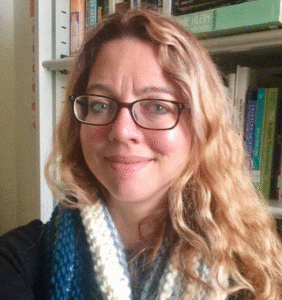
|
Brainstorming Lunch about AI and ChatGPT
September 14
As AI tools like ChatGPT continue to evolve, so too have Trinity faculty experiences with these programs. Please join us for a semi-structured brainstorming lunch that builds upon our spring 2023 ChatGPT workshop. Several colleagues with expertise with ChatGPT will attend this event, and we look forward to discussing the ways these technologies impact our work inside and outside the classroom. |
|
Spring 2023
2022–2023 CTL Fellows Presentations
Common Hour, Hallden Hall – Dangremond Family Commons 104
April 27: Sustainable Approaches to Iterative Instructional Design
Presenters: Kelly Dugan, Alex Helberg, Michael Grubb, and Mike Puljung
This group of fellows will present their approaches to sustainable and iterative instructional design, ranging from summative sequences across semester-long courses to individual projects with specified learning objectives. Each of these projects provides insights on how instructors can design instructional sequences to be efficiently and effectively repeated across multiple semesters, while providing helpful feedback to instructors that can positively influence subsequent iterations of each sequence. Click here to view the presentations.
April 25: Critical Conversations and Inclusive Pedagogy
Presenters: Jason Doerre, Stefanie Chambers, Kifah Hanna, and Tim Landry
Panelists will examine global and local perspectives relating to pedagogical strategies and approaches for teaching challenging topics such as race, ethnicity, gender, sexuality, and religion. Topics include teaching the holocaust and antisemitism; diversity and exclusion in the American wine industry; queer narratives from the Middle East; and the overlaps between queerness and religion. Click here to view the presentations.
April 20: Assessing Assessment
Presenters: Beth Casserly, Kyle Evans, Deborah Fixel
Whether students meet our learning goals depends on what we ask them to do and how we, as instructors, or the students themselves, assess their work and learning. We share our CTL projects on assessment which include: building coding skills through a team project and research articles, student self-evaluations on homework problem sets, and the implementation of “ungrading” for a whole course. We also plan to engage attendees in a critical discussion on the value of assessment and our own practices. Click here to view the presentations. |
|
Challenging White Supremacy Culture in Community Engaged Learning
March 9, Common Hour
Community engagement is often positioned as a practice able to actualize commitments to and aspirations toward social justice. However, it is also recognized as a pedagogy that perpetuates whiteness and white normativity. Dr. Tania D. Mitchell, Associate Professor of Higher Education at the University of Minnesota, will speak to the social justice imperative in community engaged teaching and opportunities to interrupt white supremacy culture and enact an anti-oppressive pedagogy. To view the talk, click here. |
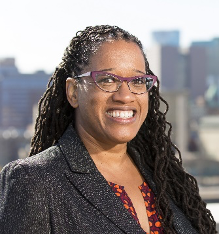
|
Chat About ChatGPT: What’s All the Buzz?
February 28, Common Hour, Zoom
Given the excitement around ChatGPT and artificial intelligence, CTL and the Digital Learning and Scholarship Group will co-sponsor a workshop/discussion to demonstrate the capabilities of ChatGPT and discuss its problems and potential use in the classroom. Click here to view the discussion. |
|
How Active Learning Can Impact Students of Different Identities
February 9, Common Hour, Zoom
While active learning has been shown to be more effective than traditional lecturing on average, how active learning is done can lead to unintended impacts on certain groups of students. This workshop presented by Sara E. Brownell, Professor School of Life Sciences at Arizona State University, will explore how common active learning practices can differentially affect women, LGBTQ+ students, students with disabilities, students with anxiety, and students with depression. Click here to view the discussion. |
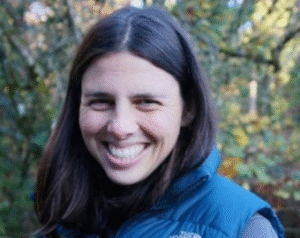
|
Faculty Identity in the Science Classroom
February 9, 4:15 PM – 5:15 PM, Zoom
Representation can help students feel that they belong in science, yet many identities are not apparent unless the instructor reveals that identity to students. This workshop, also presented by Prof. Brownell, will explore the extent to which instructors reveal concealable stigmatized identities to students in the context of science classrooms and their reasons for concealing or revealing the identities. It also will highlight two studies that explore the impact of revealing concealable stigmatized identities on students. Click here to view the workshop. |
|
Fall 2022
GRADING AND UNGRADING: A Panel Discussion on Alternative Grading Methods
November 3, Common Hour, Hallden Hall – Dangremond Family Commons 104
Join Karen Cook, Associate Professor of Music History, University of Hartford; Chris Hager, Professor of English, Trinity College; Jamie Kleinman, Associate Professor in Residence in Psychological Sciences, University of Connecticut; and Andrea Roberts, Professor of the Practice in Chemistry, Wesleyan University, on this panel discussion on innovative grading strategies. The panelists have implemented various approaches such as specifications grading and ungrading in their teaching. The impetus for these approaches has been in response to the pandemic and to their developing pedagogical philosophies about grades to motivate authentic student learning. Click here to view the discussion. |
|
What’s the Point in Ungraded Classes? Learning, Motivation, and Curiosity
October 13, Common Hour, Zoom
It often seems as if the point of college is points and grades. But many people have been questioning the centrality of points and grades. This talk by Susan Blum, Professor of Anthropology at the University of Notre Dame, will address the reasons why the speaker and other faculty have moved to ungrading their classes, showing how it’s possible to place learning and curiosity at the center of the class. |

|
Reflections on What Comes Next in Times of Uncertainty for Teaching and Learning
September 15, Common Hour, Hallden Hall – Dangremond Family Commons 104
The unexpected changes brought by the pandemic the past two years have made it hard to plan for and teach in the classroom. Stress and burnout have negatively affected faculty and student motivation and potentially student learning. Faculty members, Clay Byers, Assistant Professor of Engineering; Elise Castillo, Assistant Professor of Educational Studies; Stefanie Chambers, Professor of Political Science; and Prakash Younger, Associate Professor of English, on this panel will share perspectives on the challenges of last year and ideas on how they plan to respond this academic year. |
|
Spring 2022
Teaching and Learning as the World Unravels
March 10, Common Hour, Hallden Hall – Dangremond Family Commons 104
The world is changing. Some forces, including ubiquitous digital technology and polarizing politics, have been gathering for decades. And now the pandemic has suspended everything else, dislocating the future for us all. As teachers and learners, how should we wrestle with this era? To start this discussion, Dan Lloyd, Professor of Philosophy, will identify emerging threats to successful learning and reaffirm our collective need for cognitive empathy. We’ll also consider some concrete classroom strategies tailored to these times. Click here to view the presentation. |

|
All This And Covid, Too
March 3, Common Hour, Zoom
The increase in expressed anxiety and depression in adolescents precedes the pandemic, as the 300-student survey from 2021 has shown. Now young people are having to cope with the effects of COVID—isolation, fear of getting ill or making others ill, screens instead of people, and tremendous uncertainty. And so are WE, their teachers. How do we support ourselves as teachers who care about students, while we too suffer from what Kevin Cullen of the Boston Globe calls “pandemic fatigue fatigue”? What can teachers offer that can help students’ growth without being “in loco parentis” or “in loco therapist”? Janet Sand, Ph.D. has a long history of working with adolescents in secondary and post-secondary schools and the teachers who serve them. She is previously Chief Psychologist at Harvard University Mental Health Service and faculty of Stanley H. King Counseling Institute. Click here to view the presentation. |
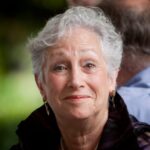
|
Fall 2021
Strategies for Supporting Students Coping with Mental Health Diagnoses
November 18, Common Hour, Boyer Auditorium
This presentation by Stefanie Chambers, Department of Political Science, and Molly Helt, Departments of Psychology and Neuroscience, will discuss specific strategies that faculty can use to support students who are managing mental health diagnoses. These include how to approach students about uneven performance, and how to make sure syllabi are inclusive. Strategies are based on both research in college mental health, as well as feedback collected from over 300 Trinity students as part of a Mellon Inclusive Pedagogy Grant. |
|
Workshop: Connecting Teaching & Learning: Making Integrity Matter
October 21, 4:15 PM – 5:15 PM, Zoom
Participants in this workshop will pick one proactive strategy (discussed in the previous presentation) that they want to develop so they can apply it in their own future class(es). Participants will share their strategy and ideas with others and also receive input that should help ensure effective implementation. To view the presentation, click here. |
|
A Proactive Approach to Integrity: Connecting Teaching & Learning
October 21, Common Hour, Zoom
The deficit approach to academic misconduct tells us that students are broken and we have to fix them. The growth mindset suggests that we can all learn from our experiences teaching and learning in a pandemic, and that there might be a new way forward that is healthier, and more learning focused. In this talk, Dr. Bertram Gallant will suggest some proactive ways to enhance integrity by focusing on good teaching and learning rather than on stopping cheating. |
|
Academic Integrity: Navigating Trinity’s Procedures, Understanding Current Trends, and Cultivating a Culture of Intellectual Honesty
October 14, Common Hour, Boyer Auditorium
Many Trinity faculty report a recent rise in instances of academic dishonesty, while institutions across the US report increased violations of their academic honesty policies. How should we as faculty, and Trinity as an institution, respond? What are the policies in place at Trinity? What are student and faculty members’ rights and responsibilities? What are recent case trends on our campus? Former chairpersons of Trinity’s Faculty Jury Pool Sarah Bilston and Janet Morrison will lead this session aimed at helping faculty understand the Trinity procedures for academic honesty violations and what trends we’ve observed in recent years in terms of numbers and types of cases on our campus; the session more generally aims to open a wider dialog about the culture of academic integrity at Trinity. This session will serve as a useful prelude to the upcoming CTL event “A Proactive Approach to Integrity: Connecting Teaching & Learning” featuring Dr. Tricia Bertram Gallant (October 21, 2021). |
|
Panel Discussion: Leveraging Design Thinking and Universal Design for Learning to Remove Barriers to Learning
September 30, Common Hour, Zoom
Barriers to learning are the places in your curriculum and instruction where students seem to get stuck. They are characterized by those moments when students are asking the same questions over and over—ones you’ve answered many times before. Barriers to learning can be discovered in those times when you find yourself having to reteach or reexplain essential information again and again. You notice all this and wonder, “What can I do to get students unstuck?” In this panel, you will explore strategies for leveraging design thinking and the Universal Design for Learning (UDL) framework to identify barriers to learning and develop manageable solutions that optimize learning for all. Panelists include Kirsten Behling, Associate Dean Of Student Accessibility and Academic Resources, Tufts University; Diana Larocco, Dean, School Of Applied Liberal Arts and Social Sciences; Director, Goodwin University Institute for Learning Innovation; Goodwin University; and Laura Patey, Dean for Academic Advancement, Wesleyan University. Click here to view the presentation. |
|
Spring 2021
2020–2021 CTL Fellows Presentations
Common Hour
April 22: Decolonizing History & STEM: Creative Uses of Primary Sources in the Liberal Arts Classroom
What do a historian, archivist, and neuroscientist have in common? They share an interest in teaching with real data and artifacts to facilitate greater student empowerment. In this presentation, CTL Fellows Sally Seraphin (Neuroscience), Cristina Bleyer (Director of Special Collections and Archives, Watkinson Library), and Seth Markle (History and International Studies) reflect on how they will seek to incorporate primary source material stored in physical and digital spaces in their courses “HIST 498/499: Podcasting History: Audio Stories from the Watkinson Library” and “NESC 313: Emotion and Motivation”. Click here to view the presentation.
April 15: Clarifying Classroom Expectations in the Age of COVID and Beyond
The pandemic has upended our classrooms in various ways, and in this panel Trinity faculty present their pedagogical responses to that upending. Three faculty from different disciplines-Blase Provitola (Language & Culture Studies), Clayton Byers (Engineering), and Vince Tomasso (Classical Studies)—this will present their projects in clarifying classroom expectations, which range from refining assessments, balancing workload, and designing coursework adapted to students’ different skill sets. These approaches will continue to inform course design long after COVID. Click here to view the presentation. |
|
Pandemic Lessons on Learning, Labor, and Loss: Charting A Path Forward
April 8, Common Hour
In this follow-up session, Dr. Betsy Barre will lead a conversation about concrete steps we might take to integrate what we’ve learned into our teaching practices moving forward. She will begin by walking us through participant feedback from Tuesday’s session. What have Trinity faculty heard from students over the last year? How have they made sense of student perceptions? What lessons have they taken away from this experience? From there, she will ask participants to identify what they take to be the most significant lesson and to collectively brainstorm ways they might implement that lesson this fall. To view the workshop, click here. Click here to view the resources from Betsy Barre’s workshops. |
|
Pandemic Lessons on Learning, Labor, and Loss
April 6, Common Hour, Zoom
The Center for Teaching and Learning invited Dr. Betsy Barre, Executive Director of the Center for the Advancement of Teaching at Wake Forest University, and author of “The Workload Dilemma”, to share with Trinity her perspectives on student learning, labor, and loss through this pandemic year. College students across the country have shared that their academic work feels especially challenging this year. Few faculty, however, set out intentionally to make their courses harder and most reduced their expectations to account for the additional challenges this year would bring. So why are students reporting this phenomenon? In this event, she will extend her analysis into larger lessons we might take with us as we move forward into the “new normal.” More specifically, she will help us think through what this moment has taught us about our traditional expectations of students and their capacity to learn in the midst of personal and social loss. To view the workshop, click here. |
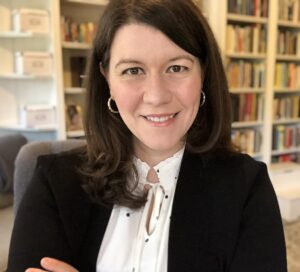
|
Fall 2020
Engagement as a Crucial Element of Resilient Course Design
December 17, Common Hour
With continuing uncertainty surrounding COVID, how do we preserve the essence of the residential liberal arts teaching and learning experience while designing our courses to be resilient in the face of changing circumstances and potential disruption? We will explore the possibilities for fostering student engagement and building a learning community through various modes and scales of connections (formal/ informal; synchronous/ asynchronous; whole class/ small group) and engage in a discussion of how to choose a mix of engagement strategies that works for your courses. To view Melissa Eblen-Zayas’ workshop click here. |
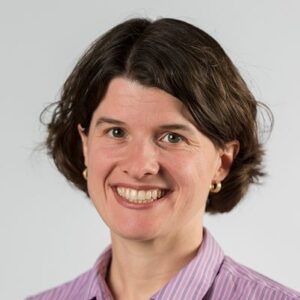
|
Pedagogical Lessons Learned Moving into J-Term and Spring
December 3, Common Hour
With a challenging semester drawing to a close, and with many challenges ahead, it is an important time to reflect on the pedagogical lessons learned teaching during the first fall of the COVID-19 pandemic. Four faculty members, Carol Clark (Economics), Amanda Guzman (Ann Plato), Luis Martinez (Neuroscience), and John Platoff (Music), briefly will share their experiences teaching in-person, remotely, and in the hybrid format before inviting a broader conversation with the audience. The conversation aims to pool experiences and elicit suggestions for supporting faculty and students in the months ahead. To view the discussion, click here. |
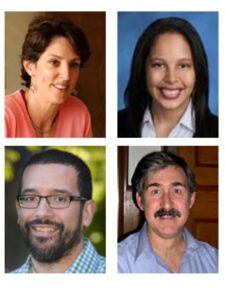
|
Spring 2020
Remote, Blended or in the Classroom: Good Teaching is Good Teaching
June 25, Zoom
Good teaching is the alchemy of passion and technique that can provide opportunities for intellectual transformations. As teachers, we are responsible to create these opportunities, while learners must attend, engage, and effectively process their experiences. Quite naturally our focus is on the first part of this equation, however, what we as teachers do, and how we do it, will greatly impact the attention, engagement, and processing of our learners. The Spring of 2020 has come to be known as the great experiment. Using emergency, remote instruction we attempted to replicate our familiar teaching/learning routines. The semester ended with teachers and learners exhausted by and with many questions about the experiment. We don’t want to repeat it, and yet we must acknowledge the uncertainty of what we face in the Fall of 2020. Our response to this uncertainty must rely on the liberal arts tradition that strives for intellectual growth in spite of challenges and provides students with opportunities for authentic learning even as they adapt to change. In this workshop, I will address three questions. How can we harness and apply our intellectual passions to teach in alternate formats? How can the principles of learning help us better direct student attention, engagement, and cognitive process? What can we expect from technology? To view Anne Law, Professor of Psychology at Rider University’s workshop, click here. |
|
Student and Faculty Perspectives on the Spring 2020 Pivot to Remote Learning
June 17
In this workshop, Stefanie Chambers, Professor of Political Science, discusses the results of the spring 2020 COVID 19 faculty and student online teaching surveys. Special attention will be devoted to pedagogical practices favored by students and faculty, and those that presented specific challenges. As we prepare for the fall semester, these survey results can help faculty generate ideas about how to structure fall courses based on assessments of students and faculty with firsthand experience with online learning. Given the diversity in classroom structures in the fall, this workshop will be particularly valuable for those who wish to consider survey results as they develop their courses. To view Stefanie Chambers’ workshop, click here. |
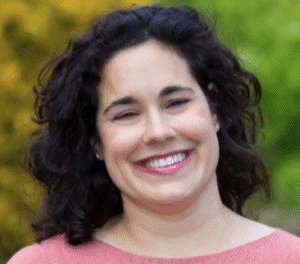
|
Understanding Implicit Bias & Microaggressions
March 5
“Implicit bias” has become a key part of the national dialogue on social justice and the term has been used in reference to several high-profile incidents: a White woman calls the police because she sees a Black man wearing socks at a swimming pool, and other examples—a pregnant interviewee is denied a job offer; a guidance counselor who decides not to recommend a low-income junior for AP History. These are incidents predicated on preconceived ideas grounded in stereotypes. A growing body of research has substantiated that individuals of any background can unconsciously foster negative attitudes and beliefs towards others based on sociocultural identities. These thought patterns, known as “implicit bias,” can translate into harmful actions, such as microaggressions. Higher education professionals must guard against their own implicit biases and support students who may encounter it during their academic careers. To view David Rivera, Associate Professor of Counselor Education in the Department of Education & Community Programs at Queen’s College’s workshop click here. |
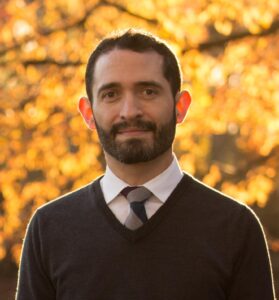
|






















